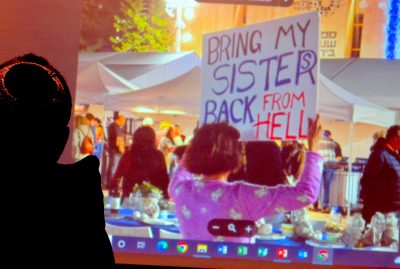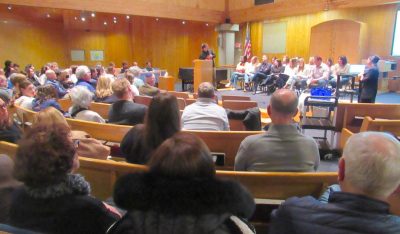Riveting Testimonies Heard From Synagogue Group’s Visit to Israel
News Based on facts, either observed and verified directly by the reporter, or reported and verified from knowledgeable sources.

Visiting a country embroiled in a horrific war means entering a zone of several realities that generate a trove of personal, hard-to-forget stories.
For a full week in early February, 18 members of Temple Beth El of Northern Westchester in Chappaqua were in Israel on a solidarity mission where they heard first-hand accounts of atrocities waged by Hamas, fueling a dark, overwhelming sense of despair and anguish.
Last Thursday evening, the congregants who made the trip shared their stories with more than 150 people inside the synagogue’s sanctuary.
Candles were lit for the 360 people killed at the Re’im music festival on Oct. 7, some of the more than 1,200 Israelis who died that day. Prayers were also said for those still being held hostage.
“We wanted to bring our community together this evening to identify and to bear witness because Israel is in pain,” said Temple Beth El Assistant Rabbi Leora Londy, who led the trip. She was joined later in the program by the synagogue’s Senior Rabbi Jonathan Jaffe.
“The people of Israel are in this unprecedented moment,” Londy noted. “Yet it’s a very familiar moment of uncertainty, a moment of fear, a moment of hope and of hopelessness. We’ve been here before; we know this moment from our DNA and our souls.”
Among the anecdotal and personal accounts, the entourage said they saw Israelis’ unbreakable sense of faith, hope and resiliency. The group was consistently thanked for visiting the country and trying to understand their day-to-day struggles.
Stories were told with photos, maps and videos. Matt Laurence shared one account of an Israeli man named Rami Davidian who, with friends, rescued 750 people from the attack at the music festival. Amidst the carnage, he managed to slip past armed terrorists to save lives.
Cheryl Ehrlich told of stopping just miles away from the Gaza border to see the burned, crushed cars riddled with bullet holes near the festival grounds.
“There were more than 1,000 vehicles – cars, motorcycles, one ambulance – in piles of melted and burned-out cars that were 20 feet high,” Ehrlich recalled.
The grounds are now considered a cemetery because of human remains still inside the vehicles.
“The government has brought in forensic technicians, dentists and experts from the Israeli Antiquities Society,” she said. “They want to be able to identify who the occupants were using fragments of DNA, blood and from iPhones melted into dashboards, car seats and more.”
Pictures showed how that site has been turned into a memorial with tributes to the murdered festivalgoers and a photo for each victim on a pole held up by a mound of stones next to an Israeli flag.
They learned from speaking to soldiers in the Israel Defense Forces (IDF) that their goal was to destroy Hamas and their tunnels. The tunnels are now known to snake underground for over 350 miles, fortified with doors that are similar to those found on submarines, spaced 800 feet apart for protection against being flooded out.
Painful stories were told of how a mother was murdered in front of her three children as others were being slaughtered in a brutal attack at Kibbutz Holit. The children were later released at the border. There were gut-wrenching descriptions of how kibbutz children and adults hid from terrorists and how some survived and were rescued while others didn’t.
Each deeply personal account was taken in by the audience in muted silence.
Meeting with those who lost relatives reinforced the reality that everyone in Israel has been touched by the war. Many of those who made the trip attested to having a new and clear understanding of what was happening.

Repeatedly, the Temple Beth El entourage felt the strength of the Israeli people and their ability to find an inner joy. While at the music festival site, they saw men spontaneously sing, and were told of a recent birthday party for two children. At a farmer’s market, Israeli soldiers broke out in song and dance.
The trip included visits to an herb farm where travelers helped harvest mint, a roadside resting stop that was a respite for IDF soldiers entering and leaving Gaza. In Jerusalem, some visited the Wailing Wall, Israel’s Emergency Medical Services headquarters and a warehouse outside Tel Aviv where members helped pack supplies to send to Israeli soldiers. At Sheeba Hospital near Tel Aviv, they visited wounded soldiers, many of whom had lost limbs and others suffering from PTSD.
At Tel Aviv’s Hostages Square, there was a gathering space to remember the hostages with large tents showing pictures of those being held or still missing. A large Shabbat table had empty seats and settings for each hostage.
Sounds of explosions could often be heard during the trip, and the members were told it was Israel’s defense system, the Iron Dome, deflecting incoming missiles from Gaza.
Getting to know refugees that were housed in the same hotels personalized exchanges with those temporarily displaced, ones that told of an unyielding will to survive. A sense of a greater, international Jewish community was mentioned several times during the presentation.
That Hamas uses hostages, especially children, as human shields added to the frustration felt by the IDF when targeting Hamas leaders, making it difficult to save people.
“How do you kill Hamas leaders without killing hostages, without killing the people you are trying to save?” asked Amy Bialek, who explained how Hamas moved hostages to Rafah to lure the IDF to attack.
“And then the world is outraged because the Palestinians are moved to Rafah,” she said. “Hamas knows they are winning the propaganda war right now and the rest of the world so easily accepts the idea that Israel lacks humanity.”
Temple members learned of Hamas battle tactics, which included shooting from schoolhouses, mosques and hospitals. Hamas military riding motorcycles place a child in front and in back for protection. They also learned that hostages have been split into small groups of five and are moved whenever Hamas leadership relocates.
At the end of the program, Matt Cantor spoke of seeing the Knesset, the Israeli parliament, in Jerusalem. The group met with Gilead Kariv, the only reform rabbi in the Knesset, who fear expansion of the war.
“Kariv spoke about how there has to be a two-state solution, but how there wasn’t going to be one in our lifetime or our children’s lifetime,” Cantor said. “But he also said a two-state solution was necessary because in order to be a Jewish, Democratic state, they can’t rule all the non-Jews, Arabs, Muslims, Christians, the West Bank and Gaza.”
Toward the end of the presentation, Alonna Travin said she went to Israel looking for life but because there was death, war and uncertainty, it was as though she was paying a week-long shiva call. Shiva is the Jewish practice of mourning a death with relatives and friends.
“When you pay a shiva call there’s crying, sadness and grief, but there’s also remembering, laughing and telling stories,” Travin commented. “From all of the heavy stuff we were hearing I was looking for life. And because it was Israel there was still so much of it despite the fact that people were still being held hostage, people were fighting and dying.”
A final video proved Travin’s point, which showed a random street festival in Jerusalem at night where foot-tapping music energized young Israelis to dance. The infectious energy swayed temple members to join in.
“That’s what makes Israel so remarkable,” Travin said. “And although it was sad to be there, it was really truly a joy.”
Temple Beth El is planning another trip to Israel in December.

Abby is a seasoned journalist who has been covering news and feature stories in the region for decades. Since The Examiner’s launch in 2007, she has reported extensively on a broad range of community issues. Read more from Abby’s editor-author bio here. Read Abbys’s archived work here: https://www.theexaminernews.com/author/ab-lub2019/
